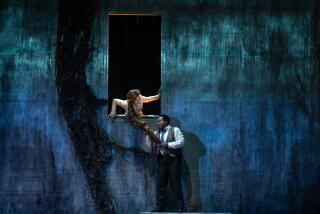Music Reviews : Pianist Mogilevsky in Southland Debut
- Share via
The Odessa-born Yevgeny Mogilevsky, who belatedly made his Southern California debut Thursday night at Ambassador Auditorium, seems to be the polar opposite of another lionized Slavic pianist, Lazar Berman, his senior by a decade and a half.
Whereas Berman is an outgoing, display-oriented, wham-bang kind of pianist, Mogilevsky, 47, is an inward-looking, navel-contemplating, obsessively thoughtful keyboardist. Because both virtuosos operate on a high level of artistic achievement, of course, each is required occasionally to play against type; their relative success at doing so only points up their specialties.
Make no mistake, however: Mogilevsky’s technical accomplishments can compete, as they often have, in any international arena. His debut program, containing major works by Schumann, Ravel and Prokofiev, demonstrated his ability to handle all mechanical and musical challenges posed by these composers.
But the youthful-appearing musician from the Ukraine, who looks more like a tenor than a pianist, has chosen to startle his listeners, not by pounding--which he certainly can do, by the way--but by a caressive approach to the instrument. Thursday, he caressed some of his observers right into ennui.
The problem is not his soft-playing, an admirable specialty in any pianist. The problem lies in his lack of coloration at all dynamic levels. Monochromatic in the extreme, his playing simply lacks range. He varies his touch almost never, fails to distinguish between the many possibilities in legato and staccato, and projects little emotional breadth. And his basic sound, loud or soft, is utilitarian rather than beauteous.
Schumann’s beloved “Arabeske,” Opus 18, which opened the program, mezza voce, provided Mogilevsky’s finest moment, one he sustained handsomely through the length of the piece. But even here, his failure to find more emotional resonance, as well as louder passages, demonstrated a lack of imagination.
The same composer’s “Kreisleriana,” which followed, contains many more feelings, nuances and distinct moods than emerged here.
Ravel’s “Gaspard de la Nuit,” always a tour de force for one who can play it with honesty, received careful and faceted treatment but came out no more compelling. And the lengthy closer, Prokofiev’s discursive Eighth Sonata, seemed truly persuasive only in the cogent poetry of the Andante sognando.
More to Read
The biggest entertainment stories
Get our big stories about Hollywood, film, television, music, arts, culture and more right in your inbox as soon as they publish.
You may occasionally receive promotional content from the Los Angeles Times.










